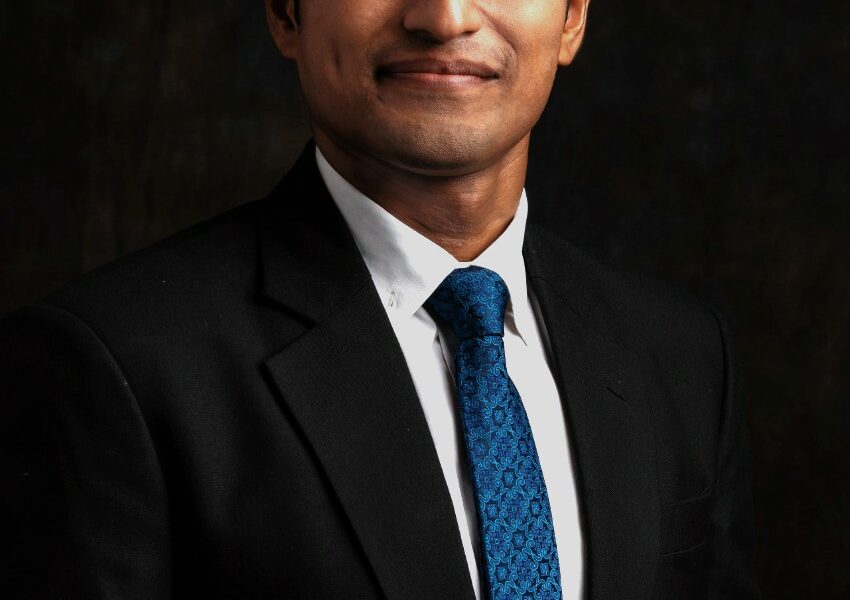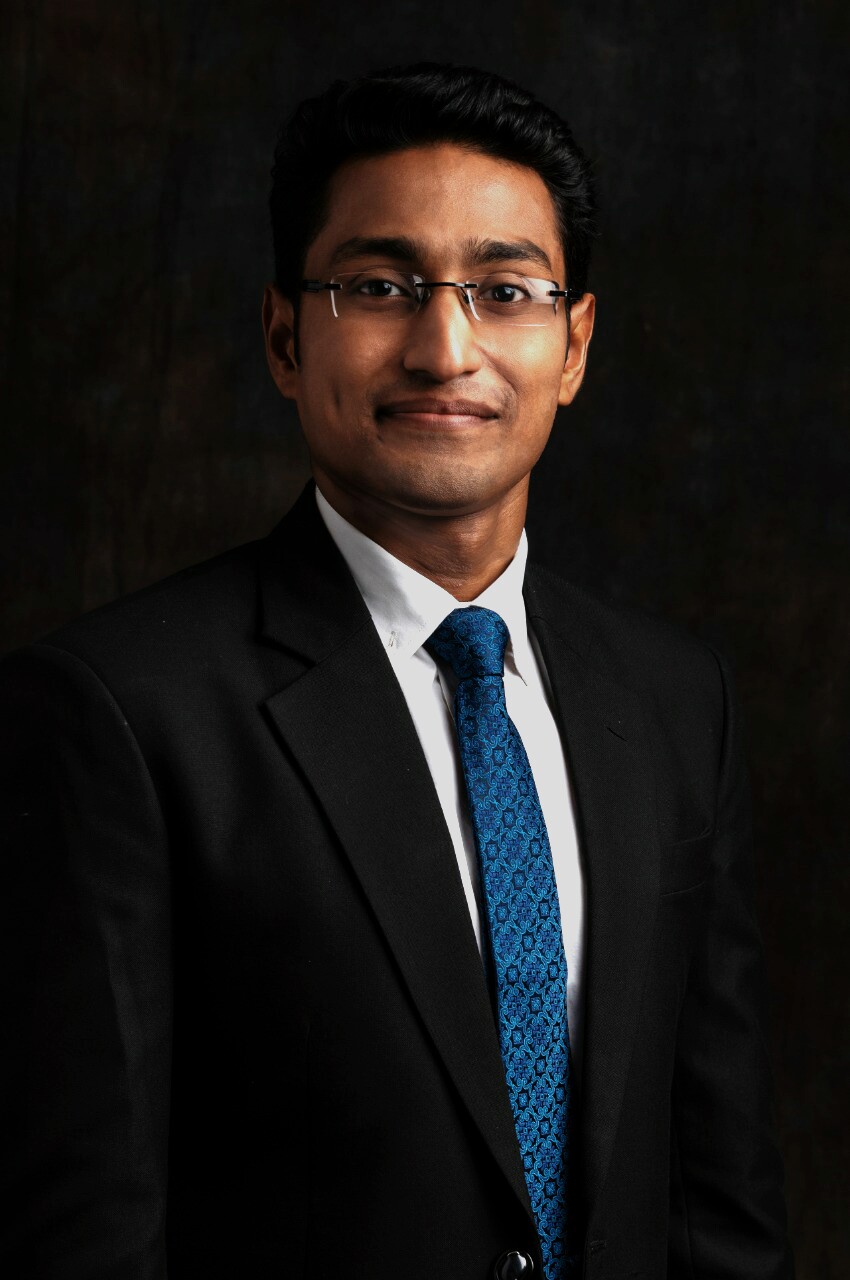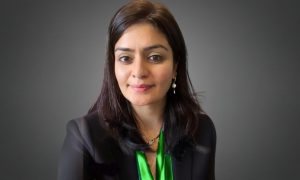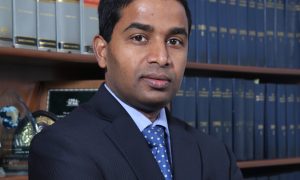This interview has been published by Priyanka Karwa and The SuperLawyer Team

Please share with us your journey into the field of law and how you ended up specializing in Commercial Litigation and Dispute Resolution?
It’s quite interesting that I never wanted to study law in the first place! Not having studied science during my 11-12th standards (mostly because I was despicable at it!) made options very limited even more so for someone like me who belongs from a family of doctors. I was always interested in fine arts and thus intended to study history and literature. I got through the iconic Presidency College for History (Hons) , however it was my father’s insistence, despite being a doctor himself, that I should “strongly” consider law as an option. My reluctance, of course, cost me from getting through the NLU’s (National Law Universities) and I ended up studying from a Non-NLU (or as we call it a traditional university, which also happened to be one of the oldest in the State). Much to my surprise law school was an excellent learning curve, mostly owing to some brilliant lecturers who spurred me on (it would be an absolute travesty not to mention three of them: Dr S K Chakrabarti, Mr Navin Sinha and Mr B Sarkar, with whom I must have lost in touch much to my own failures).
Being from Non-NLU comes with its set disadvantages, one of them was, being cloistered from national or global corporate exposure. I had one singular aim in mind, I wanted to go to court, be there, plead, argue, watch, learn and practice. I kept my mind open as to where the profession might take me without pre-empting myself from dedicating myself to a particular area of law early on. This led me to my first senior Mr Paritosh Sinha of Sinha and Co. He pushed me to the original side of the great Calcutta High Court wherein I was entrusted to handle varied types of commercial matters which also included arbitrations/mediations. He trusted a greenhorn to do matters, fail, make mistakes and get up again. Slowly, what started as an innocent attempt to learn about commercial law became a serious endeavour. I was naturally drawn to commercial litigation. The thrill of being in court, the palpable tension, the adrenaline rush to assist a senior counsel arguing for hours on an interlocutory matter or in conducting a trial felt like a second skin. What contributed more was the great privilege of assisting some of the best senior barristers and counsels from the Calcutta Bar from whom I could learn (Mr Anindya Kr Mitra, The late Mr Pratap Chatterjee, Mr S.N. Mookherjee. Advocate General W.B, Mr S.N. Mitra, Mr Abhrajit Mitra, Mr Jayanta Kr Mitra, Mr Kishore Datta, Mr Anirban Ray, Mr Ratnanko Banerjee, to name a few). What was equally contributory was working with some of the best junior counsels I have encountered in my professional life. Some of them are my contemporaries yet undeniably from whom I have learned every day since last decade! (Mr Chayan Gupta, Mr Soumabho Ghose, Mr Sarvapriya Mukherjee, Mr Shaunak Mitra and Mr Pranit Bag warrant a huge mention). The more I did matters, the more I developed and a turn of fate (and a bit of hard work I would presume!) landed me with one of the oldest and biggest law firms in India, Fox and Mandal (F&M). At F&M, my skill set was tested, enhanced and tried at all levels. Under the expert guidance of Mr. Debanjan Mandal, Partner (who in my small experience is possibly one of the sharpest legal minds in India) and Mr Sandip Dasgupta, Partner, I not only learned so much about the art of solicitorship and advocacy but was continually entrusted with commercial litigation of all sorts and dispute resolution on a national and international level. By the time I realised, I had already spent a decade in the profession and I cannot imagine doing anything else!
With your extensive experience in Commercial Litigation, Dispute Resolution, and representing clients from both private and public sectors, could you highlight some of the most challenging and interesting cases you’ve handled?
There are far too many for this limited space and time! And for understandable confidential reasons, I cannot name them in detail. However, my first big matter, which grabbed a few eyeballs owing to its uniqueness, remains special. It involved a partnership business for an online gaming platform. One single matter made my foray into partnership law, derivative action under company law, and intellectual property rights – not only before the High Court but also before WIPO and the law of criminal defamation. Cases were filed, actions, reactions, counter actions and retaliations were done which pushed me to the limit- sleepless nights, countless conferences with senior barristers, days of research into points of law and arguments for hours before the court. Another, I remember distinctly wherein we were representing a major state-owned enterprise faced with an invocation of a Rs 400+ crore bank guarantee. The case apart from presenting its challenge owing to technicalities of the mining operation in question was also beleaguered by the law revolving around the invocation of bank guarantee- which as many would know is very strict. We had anticipated that we might not succeed before the Single Judge and had prepared an appeal even before the original case was filed by us! On the day, as expected we didn’t draw first blood before the single judge and a whole domino effect took place thereafter. The judgment was delivered post lunch around 2 p.m. Going by the contingency plan we immediately obtained leave to appeal without the copy of the judgement from the Chief Justices Court around 2.30 pm and pleaded the urgency to list the matter around 3.30 pm. Once listed, preliminary arguments took place and we were successful in obtaining a stay of the appeal, pending final adjudication on the same day itself around 4.30 pm! saving the state and the state enterprise from being plunged into ‘darkness’! What was not only high profile but also fraught with trepidation, now (as I look back turning time- not in a H.G. Wells manner, though!) was a full day of thrilling legal drama, which in hindsight has taught me much about holding onto nerves in the field of commercial litigation.
Your career has taken you through various practice areas, from Criminal Laws to Intellectual Property Laws and Company Law. How do you manage to excel in such diverse areas of law?
To be candid, one cannot excel in ALL spheres. However, what one can do is put his/her best foot forward, utilize the knowledge gained, and the skill set acquired and “try” to win. What is important is not just excelling but being involved and genuinely committed to the work being done and endeavouring to get the best results/outcomes in the given circumstances. Yes, being interested, inclined and involved in full steam is the stepping stone to excelling but for me, the trick is not excelling or knowing about everything but knowing everything about certain things. In that way, my belief is, the quality of work is much more refined and superior AND that is what will separate one from others.
Before pursuing your master’s degree, you worked as a Senior Associate at a renowned law firm in India. How did your experiences there shape your career and influence your decision to further your studies?
Working as a SA that too in a top law firm comes with a set of challenges. It will push and test you mentally, psychologically and most importantly intellectually. I believe working at such a high level with not just a myriad of matters to handle at a given time but also continually learning from senior counsels/barristers develops and refines one understanding of the law, its working and its granular nuances. During my time I was at a given time exposed to arbitrations, commercial litigations, drafting, research, pleading, strategic decision-making, and judgement calls- a whole universe of disputes and whatever comes with the territory. Every experience no matter how small or big the matter made a mark in the way I would think, perceive, react or even respond to situations. It made me more alert, aware and intellectually open. Quite plainly, it prepared the breeding ground for being “ready” to take on the challenge that is presented by studying at an international level. After a point, I thought that it was time to take the plunge.
What motivated you to pursue your master’s degree in International Business Law with a focus on International Commercial Arbitration and Investment Arbitration?
Turn of fate is rather a cheeky first instinctive answer to this! On a serious note though, My academic journey has been a roller-coaster ride. In 2016, I was selected for pursuing my master’s at the National University of Singapore (NUS). Unfortunately, I could not take up the offer owing to personal issues. Thereafter, I never thought of pursuing my master’s and had some of the most brilliant working years of my life. In 2020, like many, Covid gave me time to retrospect and introspect. The deep-rooted urge to pursue my master’s degree, which I thought had been quelled over the years, egged me on. I applied once again, not to NUS anymore, but only to three colleges in London (I got through two, KCL being one of them). I was certain that I wanted to study in London and one of the three colleges owing to the subjects on offer and world-class faculty. What started as a perfunctory attempt ultimately led to the doors of King’s College, London. Since my background and skillset have always been in commercial law and dispute resolution, specializing in that area was a natural choice. The strategy was to play to my strengths, which I did. The underlying objective or motivation was simple: gain a finer understanding and international exposure to the concerned area of law.
Could you share some of the key lessons or experiences from your time studying at King’s College, London, and being taught by leading barristers in the field of dispute resolution?
The experience of studying in such an iconic college is overwhelming not just in terms of the intellectual challenges that it encompasses but also the pressure to survive and perform in a batch with such diversity. Colleges like KCL always boast of an extremely diverse cohort wherein one is competing against some of the brilliant minds across the globe. During my time in England, I have been fortunate to have been taught by some of the leading barristers of not just England but of the world. Some of them include Samuel Wordsworth KC, Lucas Bastin KC, Dr. and Paul Key KC all of whom I proudly call my professors and continue to have good relationships with them. King’s College London has always, historically, been associated with leading practitioners who regularly teach. The current heavy-weight names include Samuel Wordsworth KC, Lucas Bastin KC, Dr Paul Key KC, Phillipa Webb, Julian Bailey, Jason Fry KC and Lord Guglielmo Verdirame KC. Past names include the legendary Late VV Veeder (aka Johnny Veeder), the Late Prof. Martin Hunter (of Redfern and Hunter fame), and Toby Landau KC (who has now shifted his practice to Singapore). One of the major takeaways is that the teaching methodology, the emphasis on critical thinking and the diverse views of other students compel one to engage, think, introspect, present and importantly be flexible to differing perspectives and ideas. It prepares you for critical challenges that the profession will throw at you. It goes without saying that access and interaction with the best minds, apart from being a rare opportunity, also is a tremendous learning curve.
Working with a public international law firm like Volterra Fietta must have provided unique challenges and opportunities. Could you share some of your experiences in representing states and investors in investor-state disputes?
My aim to develop in the area of investment arbitration and public international law (I had a fair amount of experience in commercial arbitrations back in India) led me to work with the renowned public international law firm, Volterra Fietta (VF). VF’s uniqueness lies in being one of the rare firms currently on the planet to exclusively specialize in various aspects of public international law be it before the ICJ or investment arbitration tribunals or the English courts. It is not every day that a ICJ case or an investment arbitration comes about but if it does one needs a firm like VF to tackle the nuances of public international law (which by the way very few can!), apprehend critical hard facts, forensically strategize and advocate the case to bring about the best results. Naturally, being with VF’s investment arbitration practice team has allowed me to gain substantial experience in advisory and highly contentious work, representing both state and investors, in connection to the interpretation of treaties and broader public international law aspects. I have the good fortune of being involved (along with others in the firm) in important matters relating to climate change before the ICJ as VF is mandated to represent one of the Caribbean countries, a multi-million dollar development construction investment arbitration disputes under ICISD for one of the small island states and also a multi-billion dollar investment arbitration against France, under the aegis of PCA, relating to gold mining concessions, to name a few. The experience has thus been very varied and testing. When working at such an international level, the stakes are always high, there is hardly any room for error. One must be on their toes, being rigorously meticulous. The test of strict timelines fixed by the court /tribunal, the precision of pleadings, the presentation of facts, the research of law, long hours (not even remembering which day it is, at times!), the advocacy before an international tribunal (which, more often than not, would consist of some of the biggest names in public international law) handling high profile client representatives are some of the challenges. One wrong step can fatally affect the case and the client. One will falter at times as to err is human, but it is equally fulfilling to learn from specialist practitioners, at the top of their form, how one can tackle these challenges every day. Hence much is credited to the inimitable Robert Volterra, Founding Partner, Mr Gunjan Sharma, Partner and Ms Angela Ha, Counsel.
Balancing your professional career as a lawyer with your passion for writing fiction and photography sounds intriguing. How do you find time to nurture your artistic pursuits alongside your legal practice?
Quite frankly, I don’t always get time as being a disputes lawyer can flush out life! However, I try my best to read, travel, capture moments and put them down into words for my own sanity. I must, of course, admit I am not a prolific writer! I am a reader more than a writer. It was, again, pure luck that one of my short stories got published (God knows how that happened but I will take it!). Understandably and bitterly right, my photography has yielded lesser results of such nature! (now, in this case, god knows why that has been so!).
Notwithstanding the dry sarcastic humour, I believe one must always find time to engage or indulge in activities outside the profession and hold them dear to the heart. For me, it is photography, reading and writing (at times!). Indeed, work pressure will always be persistent, on the flip side what is equally true is that its intensity will vary. It is in those golden bouts of intermittent sanity that one must disengage from the legal world. On a lighter vein though, maybe, I try to compensate or overcompensate for the regret of not being able to study literature and history!
What advice would you give to fresh law graduates who are aspiring to build a successful career in Commercial Litigation and Dispute Resolution, especially those who come from non-NLU backgrounds like yours?
One thing to be clear at the outset, is that the profession is tough. No matter which branch of law one practices, it is a rigorous profession. It becomes cruelly painstaking when one ventures and tries to eke out a living from commercial litigation and dispute resolution. As I said, being from a non-NLU background can have its challenges at the initial stages but it cannot define one’s work. It cannot define you, therefore NEVER let it. At best a non-NLU background will put you behind the race but it cannot put you out of the race. Whoever is out there from a non-NLU, do not let your background define your work. A sense of single-mindedness is required to build a career in disputes and this is what I call the “3-D” effect: Discipline, diligence and determination. There cannot be any substitute for this. There never has been and never will be. Therefore, one should concentrate on building up and creating good quality and body of work. The opportunities or recognition comes from the work one delivers and not from a person’s background. One must be patient and ready to persevere, burn the midnight oil, and suffer the frustration of less or no work and money in the initial stages. It is often said ‘love what you do and do what you love’. This might sound easier said than done but in my experience, this is the way one can work towards whatever one wants to achieve. Importantly, you cannot stop believing in the work that you are doing- this is irrespective of where you come from and whatever work one is doing. The day you stop believing in the work, it will be the end of that area of practice. As Denzel Washington said in his NAACP image awards ceremony speech, “Keep working, keep striving, never give up. Fall down seven times and get up on the eight”.
Q10. Lastly, what do you envision for your future in the field of international dispute resolution and commercial litigation? Are there any specific goals or areas you would like to explore further?
I have always been a dispute lawyer and will continue to be so. I have realised that there is so much out there on a global scale to learn not just about commercial arbitration but litigation and importantly about treaty arbitrations. My interest in dispute resolution more specifically in investment arbitration (aka treaty arbitrations) which happens to be an offshoot of public international law is much credited to Samuel Wordsworth KC (whom we fondly call “SAM”) and Lucas Bastin KC as they tapped into the brain and exposed me to the rich yet complex and beautiful word of treaty arbitrations and in turn to the universe of public international law. This has been further accentuated by my work with VF. I may not be new to the world of commercial litigation or commercial arbitration but fairly green to the universe of public international law and treaty arbitrations. People who have tasted its cypher have been sucked into this fascinating field like quicksand only to be consumed in the whirlwind of its finer nuances. I shall continue to work, explore and develop in the field. As I would say, you can take the lawyer out of disputes but never the disputes out of the lawyer! Hence, ideally, I will always strive to maintain a balance of disputes work with commercial litigation to the plausible extent it can be and look forward to working and learning from the best legal minds ploughing the planet currently.
Get in touch with Ayan De-
























